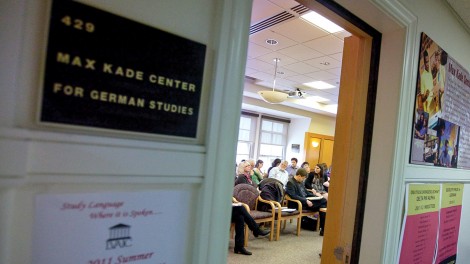The German-speaking world combines cutting-edge developments in engineering, business, and international policy with a vibrant history of music, philosophy, and visual arts.
Learning a new language is a mind-expanding experience. The German language is spoken by over 180 million people world-wide, reaching far beyond the borders of Germany, Austria, and Switzerland. The United States has a particularly rich history of German-speaking communities. Lafayette’s German program offers a vibrant environment for students interested in a broad range of areas including engineering, economics, science, and the humanities. Our faculty-led study abroad programs include the Lafayette Engineering in Bonn semester program and the six-week German Language and Culture Summer Immersion program. We have interdisciplinary affiliations with Film and Media Studies, Government & Law, International Affairs, Jewish Studies, and Women’s, Gender, and Sexuality Studies. Every year, our Max Kade Center for German Studies invites an Artist-in-Residence to work creatively with our courses, and we regularly host conversation hours and community gatherings in our event space, the Max Kade Center for German Studies. Please follow us on Instagram to learn more about our program and initiatives.
The Major in German

Hamburg, Elbe Philharmonic Hall
Comprised of eight courses (or fewer, if students demonstrate greater proficiency) beyond Elementary German 101-102, students are required to complete the language sequence up to and including Advanced German (101-102, 111-112, and 211) or demonstrate equivalent proficiency that would allow for advanced placement.
Following completion of the language sequence, majors are required to take five courses from either Business German 225 or any of the 300- and/or 400-level courses, one of which must be taken in residence during senior year. The department highly recommends that students who plan to undertake graduate studies in German pursue work on an honors project during their senior year. All majors are urged to take one or more courses in Comparative Literature. In some cases, courses taken at other institutions may be used to satisfy the requirements for the major.
The Minor in German
Comprised of five courses (or fewer, if students demonstrate greater proficiency) beyond Elementary German 101-102, students are required to complete the language sequence up to and including Advanced German (101-102, 111-112, and 211) or demonstrate equivalent proficiency that would allow for advanced placement. Following completion of the language sequence, minors are required to take at least two courses from either Business German 225 or any of the 300- and/or 400-level courses.
In exceptional cases, approved courses other than those listed may be used to satisfy the requirements for the minor.
Course Requirements in German
Language Courses (GERM 100s & 211): Students with two or more years of high school German should submit their AP, IB, or SAT II score to the registrar or take the placement test administered by the department. First-year students should take the online placement test prior to registration. Continuing students should make an appointment with the Foreign Languages & Literatures Department Head to take the exam prior to registration.
Literature, Culture, and Civilization Courses (GERM 225 & 300s): The general prerequisite for courses in this group is German 211, or equivalent proficiency. Students who perform exceptionally well in German 112 may be admitted with approval of the instructor.
Courses in German
Please see the Lafayette Course Catalog for official descriptions of the German courses and other subjects offered by the Department of Languages & Literature Studies.
Please see the Course and Exam Schedule for a current list of courses and times, including special-topics courses not listed in the permanent Course Catalog.

